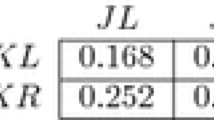Abstract
Most of the results of modern game theory presuppose that the choices rational agents make in noncooperative games are probabilistically independent. In this paper I argue that there is noa priori reason for rational agents to assume probabilistic independence. I introduce a solution concept for noncooperative games called anendogenous correlated equilibrium, which generalizes the Nash equilibrium concept by dropping probabilistic independence. I contrast the endogenous correlated equilibrium with the correlated equilibrium defined by Aumann (1974, 1987). I conclude that in general the endogenous correlated equilibrium concept is a more appropriate solution concept for noncooperative game theory than the less general Nash equilibrium concept. I close by discussing the relationship between endogenous correlated equilibrium and the game solution concept calledrationalizability introduced by Bernheim (1984) and Pearce (1984).
Similar content being viewed by others
References
Aumann, Robert: 1974, ‘Subjectivity and Correlation in Randomized Strategies’,Journal of Mathematical Economics,1, 67–96.
Aumann, Robert: 1987, ‘Correlated Equilibrium as an Expression of Bayesian Rationality’,Econometrica,55(1), 1–18.
Bernheim, B. Douglas: 1984, ‘Rationalizable Strategic Behavior’,Economtrica,52(4), 1007–1028.
Brandenburger, Adam and Dekel, Eddie: 1987, ‘Rationalizability and Correlated Equilibria’,Econometrica,55(6), 1391–1402.
Brandenburger, Adam and Dekel, Eddie: 1988, ‘The Role of Common Knowledge Assumptions in Game Theory’, inThe Economics of Missing Markets, Information and Games, ed. Frank Hahn, The Clarendon Press, Oxford, pp. 46–61.
Fudenberg, Drew and Tirole, Jean: 1992,Game Theory, The MIT Press, Cambridge, Massachusetts.
Harsanyi, John: 1977,Rational Behavior and Bargaining Equilibrium in Games and Social Situations, Cambridge University Press, Cambridge, U.K.
Harsanyi, John and Selten, Reinhard, 1988:A General Theory of Equilibrium Selection in Games, The MIT Press, Cambridge, Massachusetts.
Lewis, David: 1969,Convention: A Philosophical Study, Harvard University Press, Cambridge, Massachusetts.
Luce, R. Duncan and Raiffa, Howard: 1957,Games and Decisions: Introduction and Critical Survey, Wiley Publications, New York.
Nash, John: 1951, ‘Non-Cooperative Games’,Annals of Mathematics,54, 286–295.
Pearce, David: 1984, ‘Rationalizable Strategic Behavior and the Problem of Perfection’,Econometrica,52(4), 1029–1050.
Savage, Leonard J.: 1972,The Foundations of Statistics, Dover Publications, Inc., New York.
Shubik, Martin: 1982,Game Theory in the Social Sciences, The MIT Press, Cambridge, Massachusetts.
Skyrms, Brian: 1990,The Dynamics of Rational Deliberation, Harvard University Press, Cambridge, Massachusetts.
Skyrms, Brian: 1991, ‘Inductive Deliberation, Admissible Acts, and Perfect Equilibrium’, inEssays in the Foundations of Rational Decision, eds. Michael Bacharach and Susan Hurley, pp. 220–241.
Vanderschraaf, Peter: 1992, ‘Endogenous Correlated Equilibria and Dynamic Correlation-Deliberation’, working paper.
Author information
Authors and Affiliations
Rights and permissions
About this article
Cite this article
Vanderschraaf, P. Endogenous correlated equilibria in noncooperative games. Theor Decis 38, 61–84 (1995). https://doi.org/10.1007/BF01083169
Issue Date:
DOI: https://doi.org/10.1007/BF01083169




